Isaac
Asimov
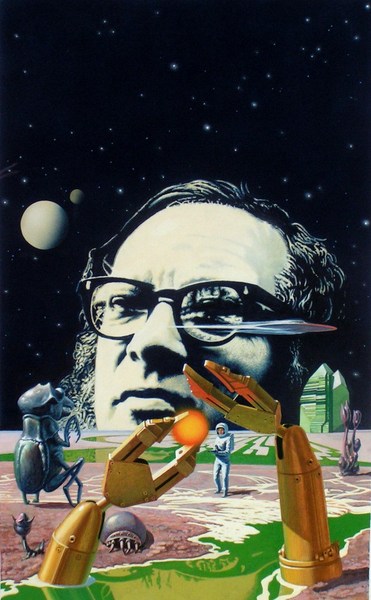 Isaac Asimov was born
Isaak Judah Ozimov, on January 2, 1920, in Petrovichi shtetl, near
Smolensk, Russia.He was the oldest of
three children. His father, named Judah Ozimov, and his mother, named
Anna Rachel Ozimov (nee Berman), were Orthodox Jews. Ozimov family were
millers (the name Ozimov comes from the eponymous sort of wheat in
Russian). In 1923 Isaac with his parents immigrated to the USA and
settled in Brooklyn, New York. There his parents temporarily changed
his birthday to September 7, 1919, in order to sent him to school a
year earlier. Their family name was changed from Ozimov to Asimov.
Isaac Asimov was born
Isaak Judah Ozimov, on January 2, 1920, in Petrovichi shtetl, near
Smolensk, Russia.He was the oldest of
three children. His father, named Judah Ozimov, and his mother, named
Anna Rachel Ozimov (nee Berman), were Orthodox Jews. Ozimov family were
millers (the name Ozimov comes from the eponymous sort of wheat in
Russian). In 1923 Isaac with his parents immigrated to the USA and
settled in Brooklyn, New York. There his parents temporarily changed
his birthday to September 7, 1919, in order to sent him to school a
year earlier. Their family name was changed from Ozimov to Asimov.
Asimov was an avid reader before the age of 5. He spoke Yiddish and English at home with his parents and spoke only a few word in Russian. He began his formal education in 1925 in the New York Public School system. From 1930-1932 he was placed in the rapid advance course. In 1935 he graduated from high school, in 1939 received a B.S. and in 1941 he earned his M. Sc. in Chemistry from Columbia University. From 1942-1945 Asimov was a chemist at the Philadelphia Naval Shipyard's Naval Air experimental station. After the war ended, he was drafted into the U.S. Army and was transfered to the island of Oahu and was destined to participate in the atomic bomb tests at Bikini Atoll in July 1946. He narrowly avoided that by receiving an honorable discharge in May 1946. In 1948 he completed his post-graduate studies and earned his Ph. D. in Chemistry. In 1949 he began his teaching career at the Medical School of Boston University, becoming assistant professor in 1951, and associate professor in 1955. In 1958 Asimov became a full-time writer and gave up his teaching duties because his income from his literary works was much greater than his professor's salary. He was fired, but he retained his title and later returned as a lecturer and was promoted ti the rank of full professor in 1979. Asimov was considered one of the best lecturers at Boston University.
Young Isaac Asimov was raised as a non-religious person. His parents observed the Orthodox Judaism, but did not force their belief upon young Asimov. He did not have affiliation with a temple, did not have a bar mizvah and called himself an atheist, then used the term "humanist" in his later life. He did not oppose genuine religious convictions in others but opposed superstitious or unfounded beliefs. Asimov defined his intellectual position as a Humanist and rationalist. He opposed the Vietnam war in the 1960s and was a supporter of the Democratic party. He embraced environmental issues, and supported feminism, joking that he wished women to be free "because I hate it when they charge". He was also humorous about many of his memberships in various clubs and foundations. Asimov did not approve exclusionary societies, he left Mensa after he found that many of the members were arrogant. He liked individuality and stayed in groups where he enjoyed giving speeches. As a free thinker, Asimov saw sci-fi literature serving as a pool where ideas and hypotheses are expressed with unrestricted intellectual freedom.
Young Asimov was fascinated with science fiction magazines which were sold at his parent's general store. Around the age of 11 he wrote eight chapters of a fiction about adventures of young boys in a small town. His first publication was "Marooned Off Vesta" in the Amazing Stories magazine in 1939. Asimov shot to fame in 1941 with 'Nightfall', a story of a planet where night comes once every 2049 years. 'Nightfall' has been described as one of the best science fiction stories ever written. Asimov wrote over five hundred literary works. He is credited for introducing the words "positronic", "psychohistory", and "robotics" into the English language. He penned such classics as "I, Robot" and the "Foundation" series, which are considered to be the most impressive of his writings. He also founded "Isaac Asimov's Science Fiction Magazine", which became a best-selling publication.
Asimov was afraid of needles and the sight of blood. Although he had the highest score on the intelligence test he had the lowest score on the physical-conditioning test. He never learned how to swim or ride a bicycle. The author who described spaceflights suffered from fear of flying. In his entire life he had to fly only twice during his military service. Acrophobia was revealed when he took his date and first love on a roller coaster in 1940, and was terrified. This fobia complicated the logistics and limited therange over which he traveled; it also found reflection in some of his literary works. He avoided traveling long distances. Instead he enjoyed cruise ships like the RMS Queen Elizabeth 2, where he occasionally entertained passengers with his science-themed talks. He impressed public with his highly entertaining speeches as well as with his sharp sense of timing; he never looked at the clock, but he spoke for precisely the time allocated. Asimov's sense of time prevented him from ever being late to a meeting. Once he discovered that his parents changed his date of birth, he insisted that the official records of his birthday be corrected to January 2, 1920, the date he personally celebrated throughout his life.
Asimov met Gertrude Blugherman on a blind date on Valentine's Day in February of 1942, they got married in July of the same year. The Asimovs had two children, son David (born in 1951), and daughter Robyn Joan (born in 1955). Asimov had known Janet Opal Jeppson since 1959. She was a psychoanalyst and also a writer of science fiction for children. Correspondence with her convinced Asimov that she was the right kind of person for him. He and Gertrude were separated in 1970, and he moved in with Janet Jappeson almost at once. His first marriage ended in divorce in 1973. That same year he and Janet Jeppson were married at Janet's home by an official of Ethical Culture Society. Asimov had no children by his second marriage.
In 1983 Asimov contracted HIV infection from a tainted blood transfusion received during a triple bypass surgery. He eventually developed AIDS and wanted to go public about his AIDS but his doctors convinced Asimov to remain silent. The specific cause of death was heart and renal failure as complications of AIDS. He died on April 6, 1992, in Boston, Massachussets, and was cremated. His ashes were scattered.
Ten years after Asimov's death, his widow, JanetJeppson Asimov, revealed that his death was a consequence of an unfortunately contracted AIDS.
;
by: Steve
Shelokhonov
Fiction Series
Black Widowers
Tales of the Black
Widowers (1974)
The Acquisitive Chuckle
Ph As in Phony
Truth to Tell
Go, Little Book!
Early Sunday Morning
The Obvious Factor
The Pointing Finger
Miss What?
The Lullaby of Broadway
Yankee Doodle Went to Town
The Curious Omission
Out of Sight
More Tales of the Black Widowers (1976)
When No Man Pursueth
Quicker Than the Eye
The Iron Gem
The Three Numbers
Nothing Like Murder
No Smoking
Season's Greetings
One & Only East
Earthset & Evening Star
Friday Thirteenth
Casebook of the Black Widowers (1980)
The Cross of Lorraine
The Family Man
The Sports Page
Second Best
The Missing Item
The Next Day
Irrelevance!
None So Blind
The Backward Look
What Time Is It?
Middle Name
To the Barest
Banquets of the Black Widowers (1984)
Sixty Million Trillion Combinations
The Woman in the Bar
The Driver
The Good Samaritan
The Year of the Action
Can You Prove It?
The Pheonician Bauble
A Monday in April
Neither Brute nor Human
The Redhead
The Wrong House
The Intusion
Puzzles of the Black Widowers (1990)
The Fourth Homonym
Unique is Where You Find It
The Lucky Piece
Triple Devil
Sunset on the Water
Where is He?
The Old Purse
The Quiet Place
The Four Leaf Clover
The Envelope
The Alibi
The Recipe
The Return of the Black Widowers (2003)
The Acquisitive Chuckle
Early Sunday Morning
The Obvious Factor
The Iron Gem
To the Barest
Sixty Million Trillion Combinations
The Wrong House
The Redhead
Triple Devil
The Men Who Read Isaac Asimov
Northwestward
Yes, But Why
Lost In a Space Warp
"Police at the Door"
The Haunted Cabin
The Guest's Guest
The Woman in the Bar
The Last Story
Foundation Universe
The Positronic Robot Stories
Additonal Cover Art
Robbie
Runaround
Reason
Catch that Rabbit
Liar!
Little Lost Robot
Escape!
Evidence
The Evitable Conflict
The Rest of the Robots (1964)/Eight Stories from The Rest of the Robots (1966)
Robot AL-76 Goes Astray
Victory Unintentional
First Law
Let's Get Together
Satifaction Guaranteed
Risk
Lenny
Galley Slave
The Complete Robot (1982)
A Boy's Best Friend
Sally
Someday
Point of View
Think!
True Love
Robot AL-76 Goes Astray
Victory Unintentional
Stranger In Paradise
Light Verse
Segregationist
Robbie
Let's Get Together
Mirror Image
The Tercentenary Incident
First Law
Runaround
Reason
Catch That Rabbit
Liar!
Satisfaction Guaranteed
Lenny
Galley Slave
Little Lost Robot
Risk
Escape!
Evidence
The Evitable Conflict
Feminine Intuition
That Thou Art Mindful of Him
The Bicentennial Man
Robot Dreams (1986)
Robot Dreams
Little Lost Robot
Breeds There a Man...?
Hostess
Sally
Strikebreaker
The Machine that Won the War
Eyes Do More Than See
The Martian Way
Franchise
Jokester
The Last Question
Does a Bee Care?
Light Verse
The Feeling of Power
Spell My Name with an S
The Ugly Little Boy
The Billiard Ball
True Love
The Last Answer
Lest We Remember
Robot Visions (1990)
Robot Visions
Too Bad!
Robbie
Reason
Liar!
Runaround
Evidence
Little Lost Robot
The Evitable Conflict
Feminine Intuition
The Bicentennial Man
Someday
Think!
Segregationist
Mirror Image
Lenny
Galley Slave
Christmas Without Rodney
(also includes 16 essays)
The Positronic Man (1992) w/ Robert Silverberg
An expanded version of "Bicentennial Man"
The Robot Collection (1983)/The Robot Novels (1988)/The Robot Trilogy (1989)/Robots and Murder (1988)
Caves of Steel
The Naked Sun
Robots of Dawn
The Caves of Steel (1954)
Foundation
Additional Cover Art
Foundation (1951) / The 1,000-Year Plan (1955)
Foundation
Foundation and Empire
Second Foundaton
Foundation's Edge (1982)
Trantorian Empire
Additional Cover Art
Pebble in the Sky (1950)
Fantastic Voyage
Fantastic Voyage (1966)
Lucky Starr
Additional Cover Art
David Starr, Space Ranger (1952)/ Space Ranger (1972)
Lucky
Starr and the Pirates of the Asteroids (1953) /Pirates of the Asteroids
(1972)
Norby Chronicles
Norby, the Mixed-Up Robot (1983) w/ Janet Asimov
Jeff and his mixed-up robot, Norby, get involved in new advenures on a strange planet.
Norby and the Queen's Necklace (1986) w/ Janet Asimov
Norby, the mixed-up robot
Norby's Other Secret
Norby: Robot for Hire (1988) w/ Janet Asimov
Norby and the Lost Princess
Norby and the Invaders
Norby Through Time and Space (1988) w/ Janet Asimov
Norby find a Villain
Norby down to Earth
Novels
The End of Eternity (1955)
Expanded verison of "Nightfall"
Child of Time (1991) w/ Robert Silverberg/The Ugly Little Boy (1992) w/Robert Silverberg
An expanded verison of "The Ugly Little Boy"
Collections
The Martian Way and Other Stories (1955)
The Martian Way
Youth
The Deep
Sucker Bait
Earth Is Room Enough (1957)
The Dead Past
The Foundation of S.F. Success
Franchise
Gimmicks Three
Kid Stuff
The Watery Place
Living Space
The Message
Satisfaction Guaranteed
Hell-Fire
The Last Trump
The Fun They Had
Jokester
The Immortal Bard
Someday
The Author's Ordeal
Dreaming Is a Private Thing
Nine Tomorrows (1959)
I Just Make Them Up, See!
Profession
The Feeling of Power
The Dying Night
I'm in Marsport Without Hilda
The Gentle Vultures
All the Troubles of the World
Spell My Name with an S
The Last Question
The Ugly Little Boy
Rejection Slips
Through a Glass, Clearly (1967)
It's Such a Beautiful Day
Belief
Breeds There a Man...?
The C-Chute
Asimov's Mysteries (1968)
The Singing Bell
The Talking Stone
What's in a Name?
The Dying Night
Pâté de Foie Gras
The Dust of Death
A Loint of Paw
I'm in Marsport Without Hilda
Marooned Off Vesta
Anniversary
Obituary
Star Light
The Key
The Billiard Ball
Nightfall and Other Stories (1969)
Nightfall
Green Patches
Hostess
Breeds There a Man...?
C-Chute
In a Good Cause
What If-"
Sally
Flies
Nobody Here But-
It's Such a Beautiful Day
Strikebreaker
Insert Knob A in Hole B
The Up-To-Date Sorcerer
Unto the Fourth Generation
What is This Thing Called Love?
The Machine that Won the War
My Son, the Physicist
Eyes Do More Than See
Segregationist
Opus 100 (1969)
The Early Asimov (1972)
The Best of Isaac Asimov (1973)
Marooned Off Vesta
Nightfall
C-Chute
The Martian Way
The Deep
The Fun They Had
The Last Question
The Dead Past
The Dying Night(
Anniversary
The Billiard Ball
Mirror Image
The Best of Isaac Asimov 1954-1972 (1973)
The Best of Isaac Asimov 1939-1952 (1973)
Have You Seen These? (1974)
The Day of the Hunters
Shah Guido G.
The Monkey's Finger
Everest
The Pause
Blank!
Silly Asses
Rain, Rain, Go Away
Buy Jupiter and Other Stories (1975)
Darwinian Pool Room
Day of the Hunters
Shah Guido G.
Button, Button
The Monkey's Finger
Everest
The Pause
Let's Not
Each an Explorer
Blank!
Does A Bee Care?
Silly Asses
Buy Jupiter
A Statue for Father
Rain,Rain, Go Away
Founding Father
Exile to Hell
Key Item
The Proper Study
2430 A.D.
The Greatest Asset
Take A Match
Thiotimoline to the Stars
Light Verse
The Bicentennial Man and Other Stories (1976)
The Prime of Life
Feminine Intuition
Waterclap
—That Thou art Mindful of Him
Stranger In Paradise
The Life and Times of Multivac
The Winnowing
The Bicentennial Man
Marching In
Old-fashioned
The Tercentenary Incident
Birth of a Notion
Opus 200 (1979)
The Winds of Change and Other Stories (1983)
About Nothing
A Perfect Fit
Belief
Death of a Foy
Fair Exchange?
For the Birds
Found!
Good Taste
How It Happened
Ideas Die Hard
Ignition Point!
It Is Coming
The Last Answer
The Last Shuttle
Lest We Remember
Nothing for Nothing
One Night of Song
The Smile That Loses
Sure Thing
To Tell at a Glance
The Winds of Change
The Edge of Tomorrow (1985)
Unique Is Where You Find It
The Eureka Phenomenon
The Feeling of Power
The Comet That Wasn't
Found!
Twinkle, Twinkle, Microwaves
Pâté de Foie Gras
The Bridge of the Gods
Belief
Euclid's Fifth
The Plane Truth
The Billiard Ball
The Winds of Change
The Figure of the Fastest
The Dead Past
The Fateful Lightning
Breeds There a Man?
The Man Who Massed the Earth
Nightfall
The Planet That Wasn't
The Ugly Little Boy
The Three Who Died Too Soon
The Last Question
The Nobel Prize That Wasn't
Opus 300 (1985)
The Alternate Asimovs(1986)
Grow Old Along with Me
The End of Eternity
Belief (two versions)
Final Word
The Best Science Fiction of Isaac Asimov (1986)
The Best Mysteries of Isaac Asimov (1987)
The Obvious Factor
The Pointing Finger
Out of Sight
Yankee Doodle Went to Town
Quicker Than the Eye
The Three Numbers
The One and Only East
The Cross of Lorraine
The Next Day
What Time Is It?
Middle Name
Sixty Million Trillion Combinations
The Good Samaritan
Can You Prove It?
The Redhead
He Wasn’t There
Hide and Seek
Dollars and Cents
The Sign
Getting the Combination
The Library Book
Never Out of Sight
The Magic Umbrella
The Speck
The Key
A Problem of Numbers
The Little Things
Halloween
The Thirteenth Day of Christmas
The Key Word
Nothing Might Happen!
Azazel (1988)
The Two-Centimeter Demon
One Night of Song
The Smile That Loses
To the Victor
The Dim Rumble
Saving Humanity
A Matter of Principle
The Evil Drink Does
Writing Time
Dashing Through the Snow
Logic Is Logic
He Travels the Fastest
The Eye of the Beholder
More Things in Heaven and Earth
The Mind’s Construction
The Fights of Spring
Galatea
Flight of Fancy
The Complete Stories, Volume II (1992)
Gold: The Final Science Fiction Collection (1995)
Magic: The Final Fantasy Collection (1996)
Back to Tirptez' Tales
Powered by WebRing.
Asimov was an avid reader before the age of 5. He spoke Yiddish and English at home with his parents and spoke only a few word in Russian. He began his formal education in 1925 in the New York Public School system. From 1930-1932 he was placed in the rapid advance course. In 1935 he graduated from high school, in 1939 received a B.S. and in 1941 he earned his M. Sc. in Chemistry from Columbia University. From 1942-1945 Asimov was a chemist at the Philadelphia Naval Shipyard's Naval Air experimental station. After the war ended, he was drafted into the U.S. Army and was transfered to the island of Oahu and was destined to participate in the atomic bomb tests at Bikini Atoll in July 1946. He narrowly avoided that by receiving an honorable discharge in May 1946. In 1948 he completed his post-graduate studies and earned his Ph. D. in Chemistry. In 1949 he began his teaching career at the Medical School of Boston University, becoming assistant professor in 1951, and associate professor in 1955. In 1958 Asimov became a full-time writer and gave up his teaching duties because his income from his literary works was much greater than his professor's salary. He was fired, but he retained his title and later returned as a lecturer and was promoted ti the rank of full professor in 1979. Asimov was considered one of the best lecturers at Boston University.
Young Isaac Asimov was raised as a non-religious person. His parents observed the Orthodox Judaism, but did not force their belief upon young Asimov. He did not have affiliation with a temple, did not have a bar mizvah and called himself an atheist, then used the term "humanist" in his later life. He did not oppose genuine religious convictions in others but opposed superstitious or unfounded beliefs. Asimov defined his intellectual position as a Humanist and rationalist. He opposed the Vietnam war in the 1960s and was a supporter of the Democratic party. He embraced environmental issues, and supported feminism, joking that he wished women to be free "because I hate it when they charge". He was also humorous about many of his memberships in various clubs and foundations. Asimov did not approve exclusionary societies, he left Mensa after he found that many of the members were arrogant. He liked individuality and stayed in groups where he enjoyed giving speeches. As a free thinker, Asimov saw sci-fi literature serving as a pool where ideas and hypotheses are expressed with unrestricted intellectual freedom.
Young Asimov was fascinated with science fiction magazines which were sold at his parent's general store. Around the age of 11 he wrote eight chapters of a fiction about adventures of young boys in a small town. His first publication was "Marooned Off Vesta" in the Amazing Stories magazine in 1939. Asimov shot to fame in 1941 with 'Nightfall', a story of a planet where night comes once every 2049 years. 'Nightfall' has been described as one of the best science fiction stories ever written. Asimov wrote over five hundred literary works. He is credited for introducing the words "positronic", "psychohistory", and "robotics" into the English language. He penned such classics as "I, Robot" and the "Foundation" series, which are considered to be the most impressive of his writings. He also founded "Isaac Asimov's Science Fiction Magazine", which became a best-selling publication.
Asimov was afraid of needles and the sight of blood. Although he had the highest score on the intelligence test he had the lowest score on the physical-conditioning test. He never learned how to swim or ride a bicycle. The author who described spaceflights suffered from fear of flying. In his entire life he had to fly only twice during his military service. Acrophobia was revealed when he took his date and first love on a roller coaster in 1940, and was terrified. This fobia complicated the logistics and limited therange over which he traveled; it also found reflection in some of his literary works. He avoided traveling long distances. Instead he enjoyed cruise ships like the RMS Queen Elizabeth 2, where he occasionally entertained passengers with his science-themed talks. He impressed public with his highly entertaining speeches as well as with his sharp sense of timing; he never looked at the clock, but he spoke for precisely the time allocated. Asimov's sense of time prevented him from ever being late to a meeting. Once he discovered that his parents changed his date of birth, he insisted that the official records of his birthday be corrected to January 2, 1920, the date he personally celebrated throughout his life.
Asimov met Gertrude Blugherman on a blind date on Valentine's Day in February of 1942, they got married in July of the same year. The Asimovs had two children, son David (born in 1951), and daughter Robyn Joan (born in 1955). Asimov had known Janet Opal Jeppson since 1959. She was a psychoanalyst and also a writer of science fiction for children. Correspondence with her convinced Asimov that she was the right kind of person for him. He and Gertrude were separated in 1970, and he moved in with Janet Jappeson almost at once. His first marriage ended in divorce in 1973. That same year he and Janet Jeppson were married at Janet's home by an official of Ethical Culture Society. Asimov had no children by his second marriage.
In 1983 Asimov contracted HIV infection from a tainted blood transfusion received during a triple bypass surgery. He eventually developed AIDS and wanted to go public about his AIDS but his doctors convinced Asimov to remain silent. The specific cause of death was heart and renal failure as complications of AIDS. He died on April 6, 1992, in Boston, Massachussets, and was cremated. His ashes were scattered.
Ten years after Asimov's death, his widow, JanetJeppson Asimov, revealed that his death was a consequence of an unfortunately contracted AIDS.
;
Fiction Series
Black Widowers
 Tales of the Black Widowers |
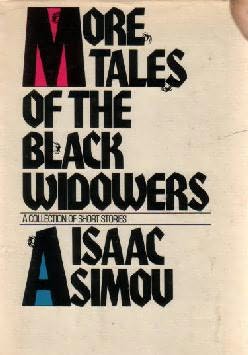 More Tales of the Black Widowers |
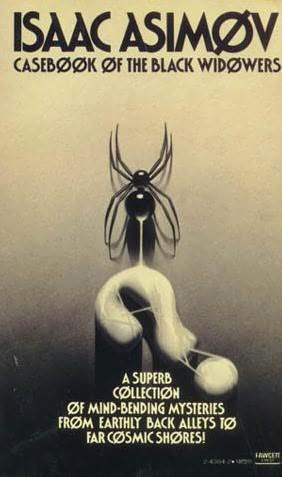 Casebook of theBlack Widowers |
 Banquets of the Black Widowers David Juniper |
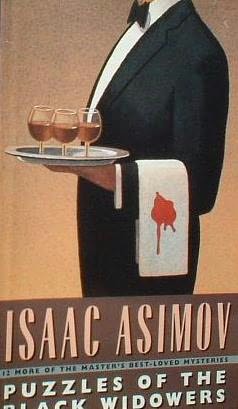 Puzzles of the Black Widowers |
 The Return of the Black Widowers |
The Acquisitive Chuckle
Ph As in Phony
Truth to Tell
Go, Little Book!
Early Sunday Morning
The Obvious Factor
The Pointing Finger
Miss What?
The Lullaby of Broadway
Yankee Doodle Went to Town
The Curious Omission
Out of Sight
More Tales of the Black Widowers (1976)
When No Man Pursueth
Quicker Than the Eye
The Iron Gem
The Three Numbers
Nothing Like Murder
No Smoking
Season's Greetings
One & Only East
Earthset & Evening Star
Friday Thirteenth
Casebook of the Black Widowers (1980)
The Cross of Lorraine
The Family Man
The Sports Page
Second Best
The Missing Item
The Next Day
Irrelevance!
None So Blind
The Backward Look
What Time Is It?
Middle Name
To the Barest
Banquets of the Black Widowers (1984)
Sixty Million Trillion Combinations
The Woman in the Bar
The Driver
The Good Samaritan
The Year of the Action
Can You Prove It?
The Pheonician Bauble
A Monday in April
Neither Brute nor Human
The Redhead
The Wrong House
The Intusion
Puzzles of the Black Widowers (1990)
The Fourth Homonym
Unique is Where You Find It
The Lucky Piece
Triple Devil
Sunset on the Water
Where is He?
The Old Purse
The Quiet Place
The Four Leaf Clover
The Envelope
The Alibi
The Recipe
The Return of the Black Widowers (2003)
The Acquisitive Chuckle
Early Sunday Morning
The Obvious Factor
The Iron Gem
To the Barest
Sixty Million Trillion Combinations
The Wrong House
The Redhead
Triple Devil
The Men Who Read Isaac Asimov
Northwestward
Yes, But Why
Lost In a Space Warp
"Police at the Door"
The Haunted Cabin
The Guest's Guest
The Woman in the Bar
The Last Story
Foundation Universe
The Positronic Robot Stories
 I, Robot Stephen Youll |
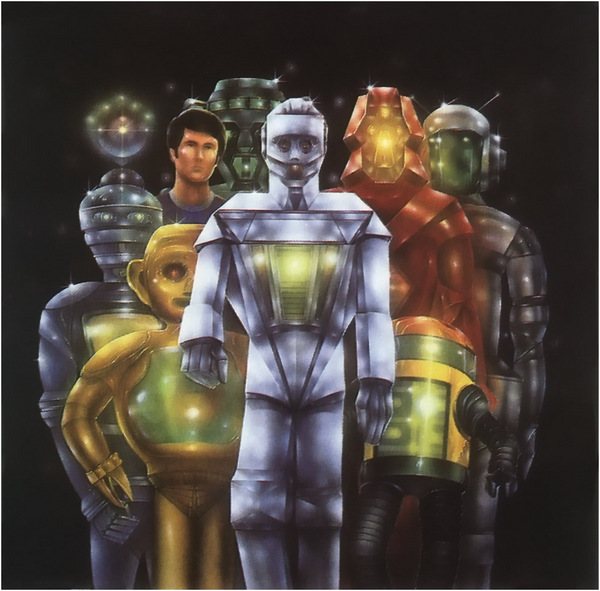 The Rest of the Robots/Eight Stories From The Rest of the Robots Jack Gaughan? |
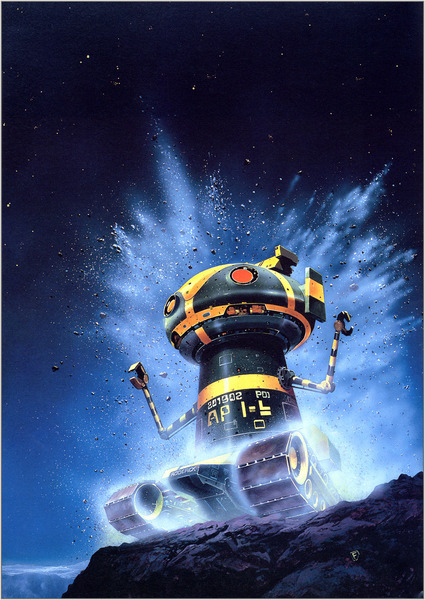 The Complete Robot Chris Foss |
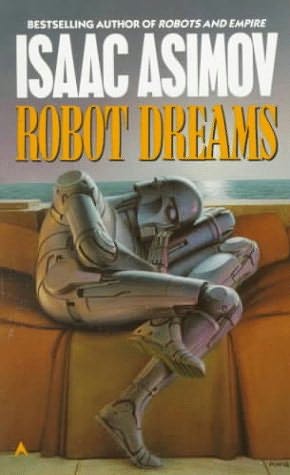 Robot Dreams Ralph McQuarie |
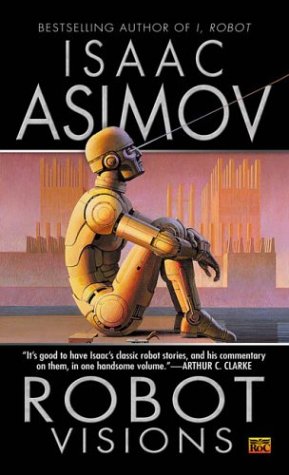 Robot Visions Robert McQuarie |
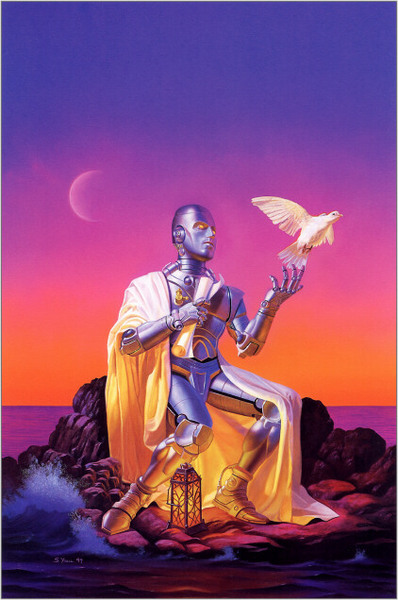 The Positronic Man w/ Robert Silverberg Stephen Youll |
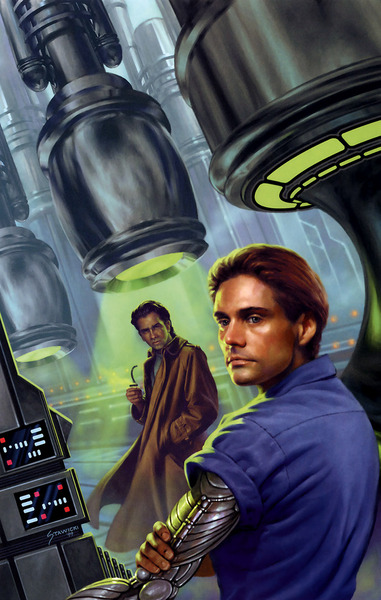 Robots and Murder Matt Stawicki |
 The Caves of Steel Michael Whelan |
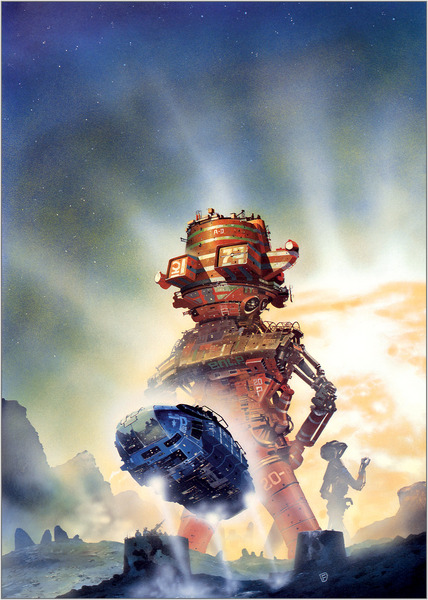 The Naked Sun Chris Foss |
 The Robots of Dawn Stephen Youll |
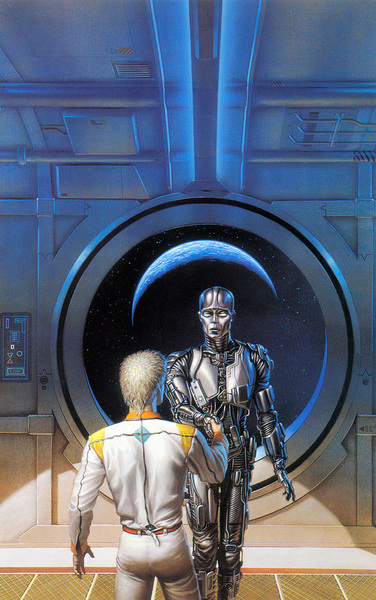 Robots and Empire Michael Whelan |
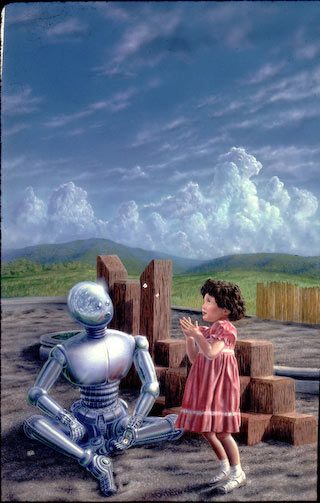 The Robot Trilogy Don Dixon |
Additonal Cover Art
The
Three Laws of Robotics:
1. A robot may not injure a human being or, through inaction, allow a human being to come to harm.
2. A robot must obey the orders given it by human beings except where such orders would conflict with the First Law.
3. A robot must protect its own existence as long as such protection does not conflict with the First or Second Law.
I, Robot
(1950)1. A robot may not injure a human being or, through inaction, allow a human being to come to harm.
2. A robot must obey the orders given it by human beings except where such orders would conflict with the First Law.
3. A robot must protect its own existence as long as such protection does not conflict with the First or Second Law.
Robbie
Runaround
Reason
Catch that Rabbit
Liar!
Little Lost Robot
Escape!
Evidence
The Evitable Conflict
The Rest of the Robots (1964)/Eight Stories from The Rest of the Robots (1966)
Robot AL-76 Goes Astray
Victory Unintentional
First Law
Let's Get Together
Satifaction Guaranteed
Risk
Lenny
Galley Slave
The Complete Robot (1982)
A Boy's Best Friend
Sally
Someday
Point of View
Think!
True Love
Robot AL-76 Goes Astray
Victory Unintentional
Stranger In Paradise
Light Verse
Segregationist
Robbie
Let's Get Together
Mirror Image
The Tercentenary Incident
First Law
Runaround
Reason
Catch That Rabbit
Liar!
Satisfaction Guaranteed
Lenny
Galley Slave
Little Lost Robot
Risk
Escape!
Evidence
The Evitable Conflict
Feminine Intuition
That Thou Art Mindful of Him
The Bicentennial Man
Robot Dreams (1986)
Robot Dreams
Little Lost Robot
Breeds There a Man...?
Hostess
Sally
Strikebreaker
The Machine that Won the War
Eyes Do More Than See
The Martian Way
Franchise
Jokester
The Last Question
Does a Bee Care?
Light Verse
The Feeling of Power
Spell My Name with an S
The Ugly Little Boy
The Billiard Ball
True Love
The Last Answer
Lest We Remember
Robot Visions (1990)
Robot Visions
Too Bad!
Robbie
Reason
Liar!
Runaround
Evidence
Little Lost Robot
The Evitable Conflict
Feminine Intuition
The Bicentennial Man
Someday
Think!
Segregationist
Mirror Image
Lenny
Galley Slave
Christmas Without Rodney
(also includes 16 essays)
The Positronic Man (1992) w/ Robert Silverberg
An expanded version of "Bicentennial Man"
The Robot Collection (1983)/The Robot Novels (1988)/The Robot Trilogy (1989)/Robots and Murder (1988)
Caves of Steel
The Naked Sun
Robots of Dawn
The Caves of Steel (1954)
Roj
Nemmenuh Sarton, a Spacer Ambassador,
lives in the Spacer outpost just outside New York City. For some time,
he has tried to convince the Earth government to loosen its anti-robot
restrictions. One morning, he is discovered outside his home, his chest
imploded by an energy blaster.
The New York police
commissioner charges Elijah with finding the murderer. However, Elijah,
like many Earth residents, has a low opinion of robots, and must work
with a Spacer partner, a humaniform robot named R. Daneel Olivaw.
Together, they search for the murderer and try to avert an interstellar
diplomatic incident.
The Naked Sun
(1957)Rikaine
Delmarre, a prominent "fetologist" of Solaria (a planet politically
hostile to Earth), is murdered. Elijah Baley is called in to
investigate, at the request of the Solarian government. He is again
partnered with R. Daneel Olivaw.
The Robots of
Dawn (1983)Elijah
Baley on Earth, training with his son and others to tolerate the
outside, in spite of their socially ingrained agoraphobia. He is
ordered to go to Washington.There, he is told that the Spacer world of
Aurora has requested through diplomatic channels that he go to Aurora.
He is told that the mind of R. Jander Panell, a humaniform robot
identical to R. Daneel Olivaw, has been destroyed via a mental block -
"roboticide" as Baley later terms it.
Robots and
Empire (1985),
the detective hero of the previous books, died two centuries earlier.
But his memory remains in the mind of his lover Gladia who, as a Spacer,
has a centuries-long lifespan as opposed to the mere decades of
Earthpeople such as Baley. It is discovered that Solaria,
the homeworld of Gladia had been abandoned and is in effect empty of
all inhabitants, save for the millions of robots that have been left
behind. She meets a seventh-generation descendant of Baley's, Daneel
Giskard (or D.G.) Baley, a Settler trader, who requests Gladia's
assistance in visiting Solaria to unravel the mysterious destruction of
Settler ships making landings there in order to take possession of the
abandoned robots.
Foundation
 The Foundation Trilogy Don Dixon |
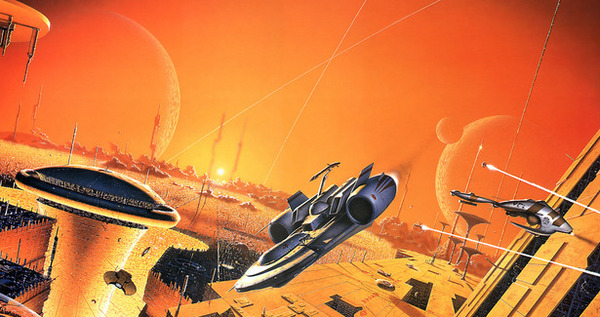 Foundation Fred Gambino |
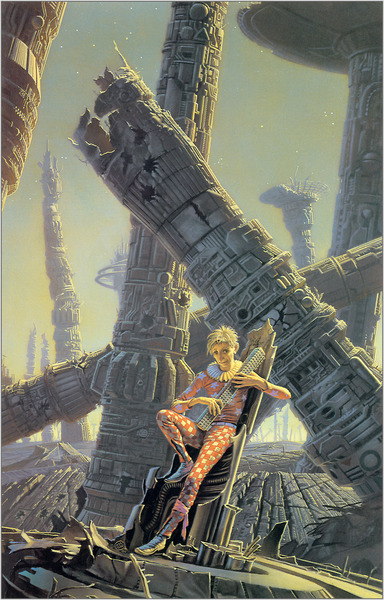 Foundation and Empire Michael Whelan |
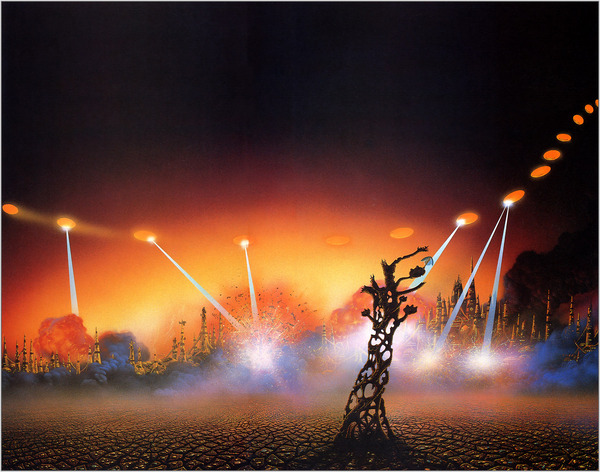 Second Foundation Tim White |
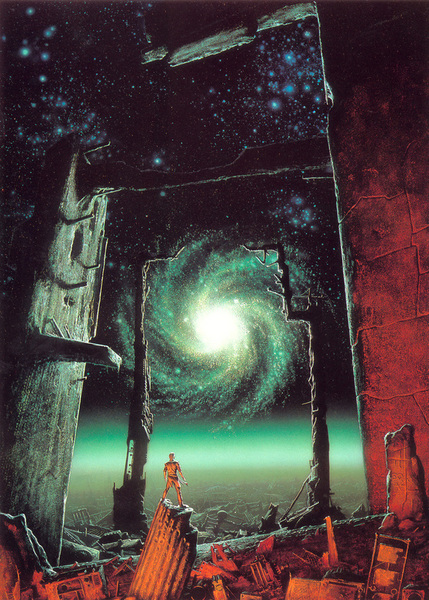 Foundation's Edge Michael Whelan |
Foundation and Earth Oscar Chiconi |
 Prelude to Foundation Tim White |
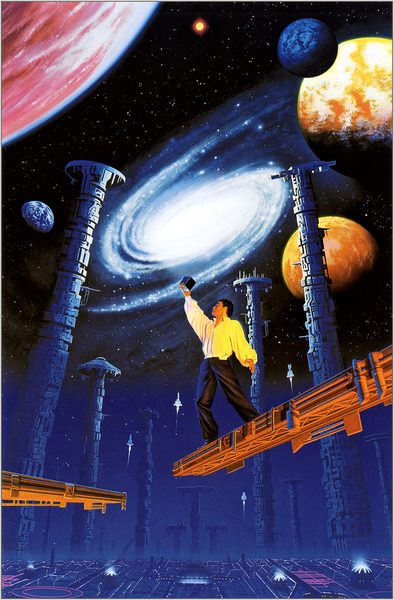 Forward the Foundation Stephen Youll |
Additional Cover Art
Foundation (1951) / The 1,000-Year Plan (1955)
The
ostensible task of Foundation, a group of savants established by
Seldon on the remote planet Terminus, is to compile the "Encyclopedia
Galactica", a complete account of human knowledge.
Foundation and
Empire (1952) / The Man Who Upset the Universe (1952)Catastrophic
events unfold as predicted by Hari Seldon. The First
Galactic Empire is crumbling at its centre; conflict rages at its
periphery, where the Traders of the Foundation based on Terminus have
become a mighty power.
Second
Foundation (1953)/ 2nd Foundation: Galactic Empire(1958)Psychohistorian
Hari Seldon was the only man in history to have
understood the shifting patterns of the inhabited cosmos. He foresaw
that the Foundation he set up on the planet Terminus would be
vulnerable, as it was to be attacked by the Mule.
The
Foundation Trilogy (1963) /An Isaac Asimov Omnibus (1966)Foundation
Foundation and Empire
Second Foundaton
Foundation's Edge (1982)
It
is 498 years since the two Foundations came into existence -
half-way through the Interregnum planned by Hari Seldon. The Second
Foundation has once more successfully concealed its existence so that
the laws of psychohistory can operate to usher in a new Empire ruled by
the mental sciences.
Foundation and
Earth (1986)Members
of the First Foundation establish contact with the telepathic
robots of the planet Gaia and with their aid go on to search for
humanity's long-lost ancestral planet, Earth.
Prelude to
Foundation (1988)This
novel describes the events that occurred in the centuries before the
opening events in Asimov's first "Foundation" books.
Forward the
Foundation (1993)
The
days of the Empire are numbered. On the Imperial world of Trantor,
Cleon II rules over a multitude of worlds slowly descending into
anarchy. Two individuals' destinies intertwine in the fight against
chaos - Hari Seldon, and Eto Demerzel, a robot and the real power
behind Cleon's throne.
Trantorian Empire
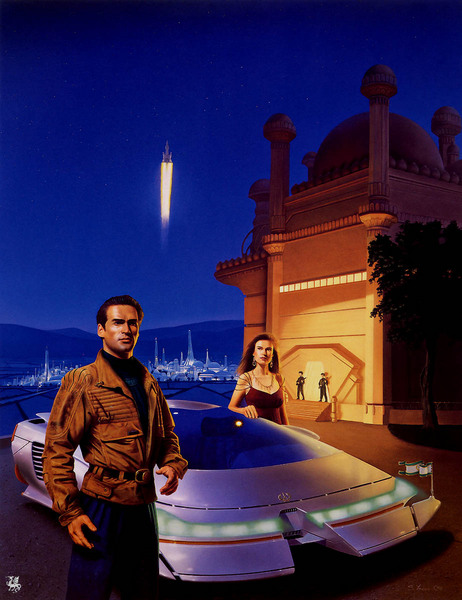 Pebble in the Sky Stephen Youll |
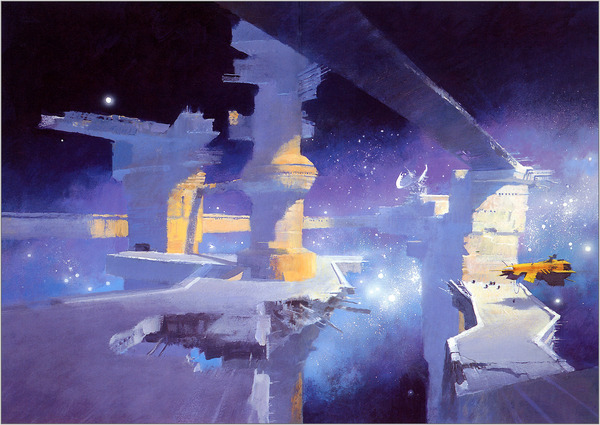 The Stars Like Dust John Harris |
 Currents of Space Stephen Youll |
Additional Cover Art
Pebble in the Sky (1950)
One
moment Joseph Schwartz is a happily retired tailor in Chicago,
1949. The next he's a helpless stranger on Earth during the heyday of
the first Galactic Empire. Earth, as he soon learns, is a backwater,
just a pebble in the sky, despised by all the other 200 million planets
of the Empire because its people dare to claim it's the original home
of man. And Earth is poor, with great areas of radioactivity ruining
much of its soil--so poor that everyone is sentenced to death at the
age of sixty. Joseph Schwartz is sixty-two.
The Stars, Like
Dust (1951) /The Rebellious Stars (1954)The
Nebular Kingdoms had been conquered a century before by the
merciless Tyranni. Now Biron Farrill's father had disappeared.
The Currents of
Space (1952)
High
in their fortified city, protected by brutal mercenaries, the
Sarkites live in magnificient luxury. Below them, in the eternal Spring
of Florina, "the most beautiful planet in the Galaxy," the native
Florinians labor ceaselessly in dire poverty to produce the precious
kyrt fiber that brings wealth to their masters, the Squires of Sark.
Suddenly there is a cryptic warning from space.
Fantastic Voyage
 Fantastic Voyage Enid Hatton |
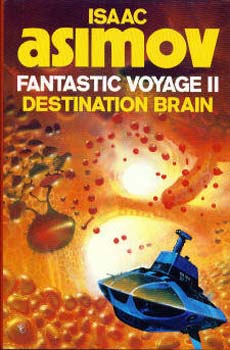 Fantastic Voyage II Chris Foss |
Fantastic Voyage (1966)
Four
men and a woman are reduced to a microscopic fraction of their
original size, sent in a miniaturized atomic sub through a dying man's
carotid artery to destroy a blood clot in his brain. If they fail, the
entire world will be doomed.
Fantastic Voyage
II: Destination Brain (1987)
Comrade
Pyotr Shapirov has a secret of vital importance to world
science, but the only man with the skill to extract it from his
comatose brain is American scientist Albert Jonas Morrison. Natalya
Boranova, sent by the Russian high command to get Morrison's help, will
stop at nothing to ensure his co-operation. But there is one major
problem - the necssity for human miniaturisation.
Lucky Starr
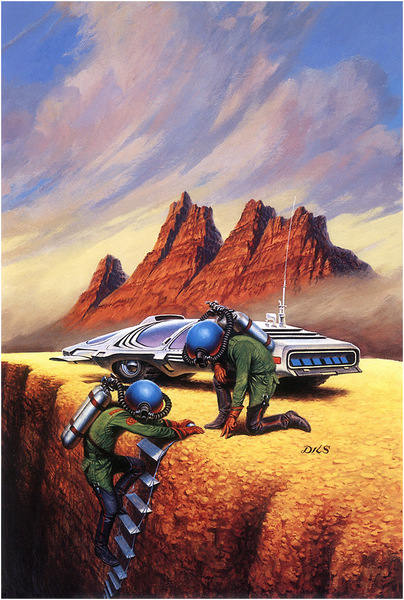 David Starr, Space Ranger Darrell K Sweet Del Rey 1984 |
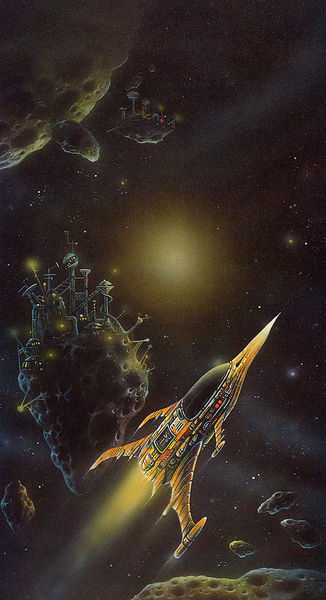 Lucky Starr and the Pirates of the Asteroids Danny Flynn Lightning 1988 |
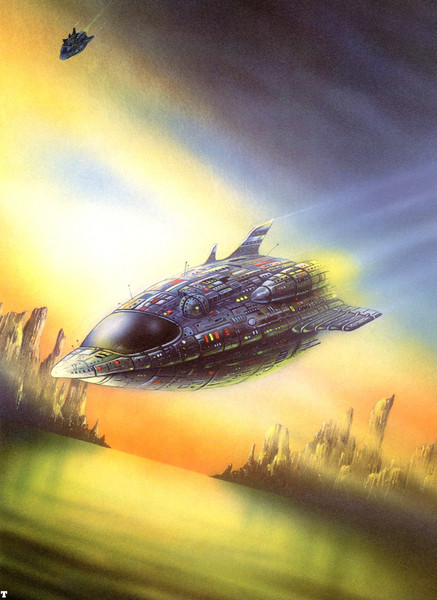 Lucky Starr and the Oceans of Venus Danny Flynn Lightning 1988 |
 Lucky Starr and the Big Sun of Mercury Don Maitz Fawcett Crest 1978 |
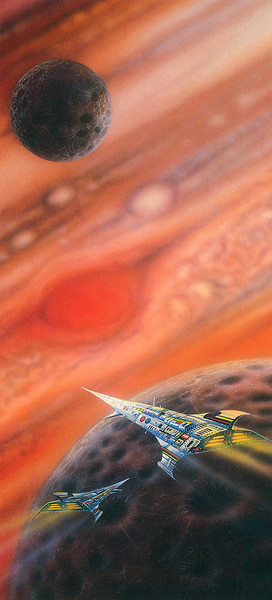 Lucky Starr and the Moons of Jupiter Danny Flynn Lightning 1988 |
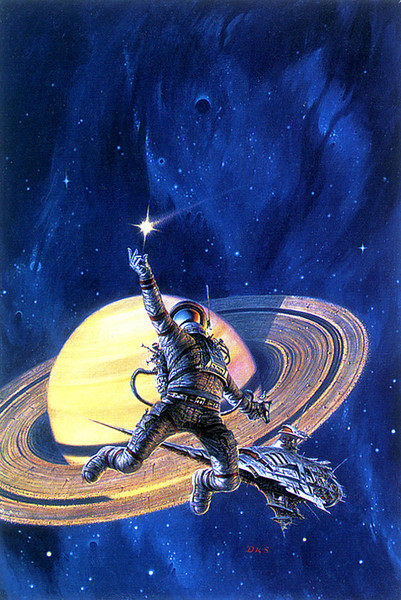 Lucky Starr and the Rings of Saturn Darrell K Sweet Del Rey 1984 |
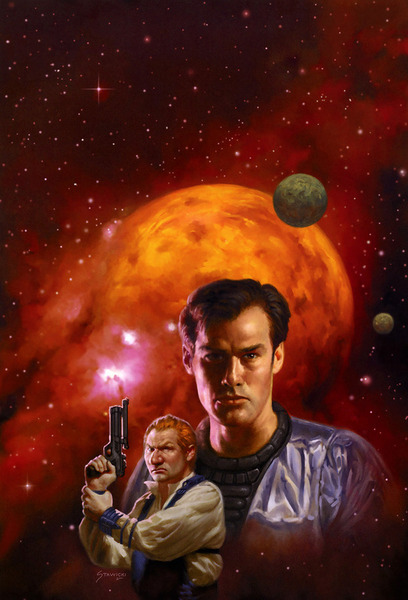 The Complete Adventures of Lucky Starr Matt Stawicki SFBC 2001 |
Additional Cover Art
David Starr, Space Ranger (1952)/ Space Ranger (1972)
The
Solar System had long ago been
colonized by an Earth suffering from a dwindling food supply and a
millionfold increase in population. The colonies were her very
lifeblood. Without hte daily flow of products from them, Earth would
experience mass starvation and chaos within weeks. Suddenly and
unexpectedly, reports of fatal food poisoning, traceable to Martian
produce, began to reach the ruling Council of Science. Each new case
was treated with intense secrecy for if the people of Earth learned the
cause of these deaths, a worldwide panic would surely ensue.
To David Starr, Space Ranger, these deadly incidents formed a terrifying pattern—they were clearly part of a clever and brutal scheme by an alien conspiracy to cripple Earth’s economic life and topple its government!
To David Starr, Space Ranger, these deadly incidents formed a terrifying pattern—they were clearly part of a clever and brutal scheme by an alien conspiracy to cripple Earth’s economic life and topple its government!
Twenty-five
years before, Lucky Starr’s parents had been destroyed
during a pirate raid on the Terrestrial Empire. Lucky had since
brooded, awaiting a chance to avenge their deaths. Now the vermin of
space once more threatened the empire’s safety and tranquility. The
time for sweet vengeance was near.
Lucky was at the helm as his space ship, the Atlas, was being readied for takeoff. The Luna City exhaust pit yawned as the ship’s main rockets blasted their fury into it. Slowly and with majesty the Atlas lifted and moved upwards, its speed increasing, its mission underway. It pierced the black sky, shrinking until it was only a star among stars, and then it was gone.
'One man against the pirates of the asteroids,' Lucky’s friend, Conway, mused sadly. 'Soon the ship will be a rain of molten metal,' he thought. 'Lucky Starr and the Atlas are doomed!'
Lucky Starr
and
the Oceans of Venus (1954) /Oceans of Venus (1988)Lucky was at the helm as his space ship, the Atlas, was being readied for takeoff. The Luna City exhaust pit yawned as the ship’s main rockets blasted their fury into it. Slowly and with majesty the Atlas lifted and moved upwards, its speed increasing, its mission underway. It pierced the black sky, shrinking until it was only a star among stars, and then it was gone.
'One man against the pirates of the asteroids,' Lucky’s friend, Conway, mused sadly. 'Soon the ship will be a rain of molten metal,' he thought. 'Lucky Starr and the Atlas are doomed!'
In the sprawling spheres far below the boundless seas
of the planet,
the earthmen had established an incredible civilization. But now, a
series of seemingly trivial accidents threatened to obliterate all that
the men had created.
It was Lucky’s job, as a representative to the powerful Council of Science, to find the evil and root it out.
Yet by the time he discovered the insidious force which preyed on the minds of men, the only enemy he could hope to destroy... was firmly lodged within his own head!
Lucky Starr and
the Big Sun of Mercury (1956) /The Big Sun of Mercury (1972)It was Lucky’s job, as a representative to the powerful Council of Science, to find the evil and root it out.
Yet by the time he discovered the insidious force which preyed on the minds of men, the only enemy he could hope to destroy... was firmly lodged within his own head!
The
barren crust of Mercury lay covered by a network of wire designed
to harness the dazzling blaze of the sun and send it sizzling through
hyperspace.
But someone, or something, on tha airless world was sabotaging the top secret mission. Where no life was said to exist, impossible 'ghosts' had been seen, and murderous snakes of alien rock had condemned the innocent to death.
It is to this troubled planet that Lucky Starr is sent by the powerful Council of Science. Who or where the enemy is... no one knows. And in order to find out, Starr must face the most deadly — and insane — opponent of his young career!
Lucky Starr and
the Moons of Jupiter (1957) /The Moons of Jupiter (1973)
But someone, or something, on tha airless world was sabotaging the top secret mission. Where no life was said to exist, impossible 'ghosts' had been seen, and murderous snakes of alien rock had condemned the innocent to death.
It is to this troubled planet that Lucky Starr is sent by the powerful Council of Science. Who or where the enemy is... no one knows. And in order to find out, Starr must face the most deadly — and insane — opponent of his young career!
Agrav. It was the century’s most important advance in space travel...
and an experiment so revolutionary that only the men who huddled
beneath the surface of Jupiter Nine were permitted to know its full
meaning.
Yet someone else did know - knew everything, saw everything, heard everything - and was diabolically sabotaging the top-secret mission.
Who or what the enemy was, Lucky Starr didn’t know. But one thing was certain. The deadly force was not human... not even remotely human!
Lucky Starr
and
the Rings of Saturn (1958) /The Rings of Saturn (1973)Yet someone else did know - knew everything, saw everything, heard everything - and was diabolically sabotaging the top-secret mission.
Who or what the enemy was, Lucky Starr didn’t know. But one thing was certain. The deadly force was not human... not even remotely human!
The
twin rings of Saturn were suddenly swarming with the robot ships of the
deadly Sirian enemy.
The avowed antagonists of Earth, they had crossed 50 trillion miles of space to provoke a war which they knew they could not lose…for the awesome forces of earth dared not rally against the invaders.
Only Lucky Starr, of Earth’s Council of Science, had a chance to avert the impending galactic holocaust. But one slip-up in his daring plan woould mean certain death... and a place in history as Earth’s most infamous traitor!
The
Complete
Adventures of Lucky Starr (2001)The avowed antagonists of Earth, they had crossed 50 trillion miles of space to provoke a war which they knew they could not lose…for the awesome forces of earth dared not rally against the invaders.
Only Lucky Starr, of Earth’s Council of Science, had a chance to avert the impending galactic holocaust. But one slip-up in his daring plan woould mean certain death... and a place in history as Earth’s most infamous traitor!
Norby Chronicles
Norby, the Mixed-Up Robot |
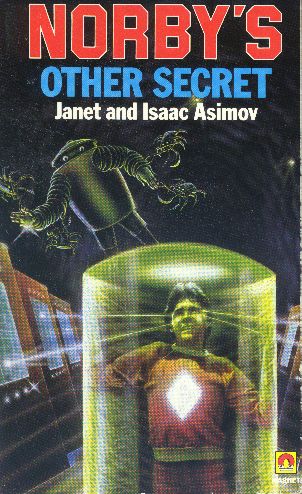 Norby's Other Secret |
 Norby and the Lost Princess |
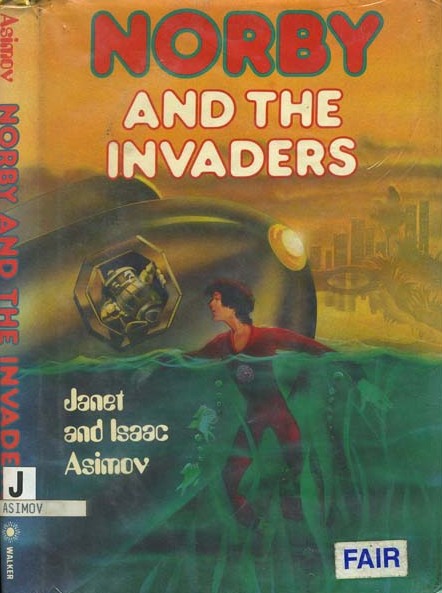 Norby and the Invaders |
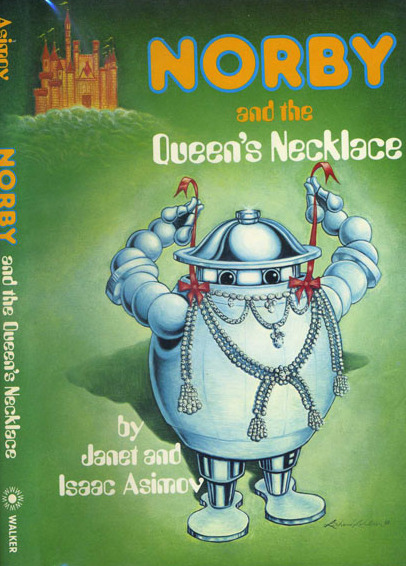 Norby and the Queen's Necklace Barclay Shaw |
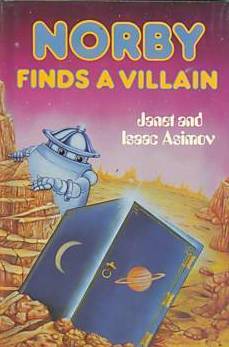 Norby Finds A Villain Barclay Shaw |
Norby Down to Earth Barclay Shaw |
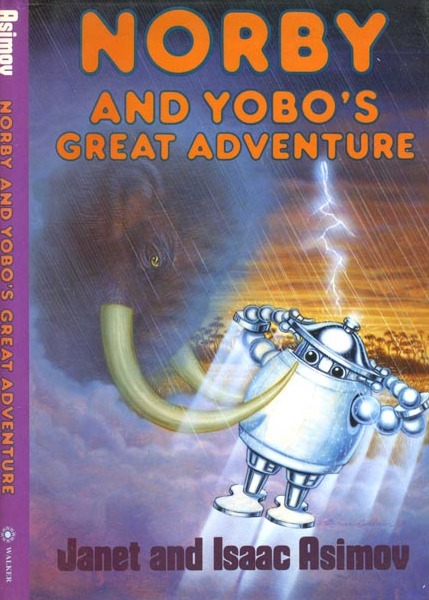 Norby and Yobo's Great Adventure Barclay Shaw |
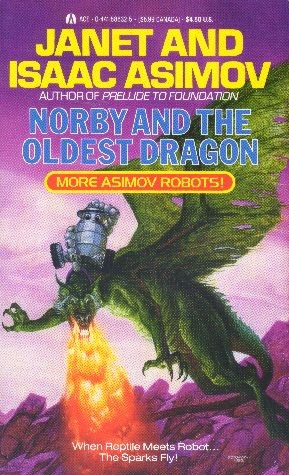 Norby and the Oldest Dragon Dave Dorman |
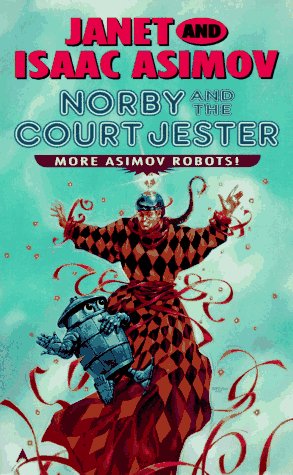 Norby and the Court Jester Dave Dorman |
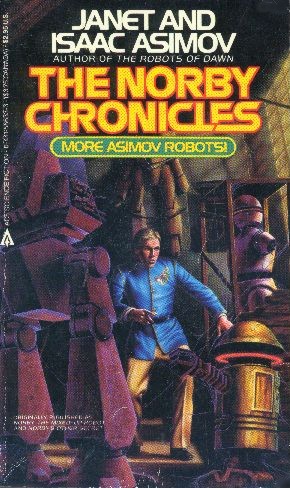 The Norby Chronicles |
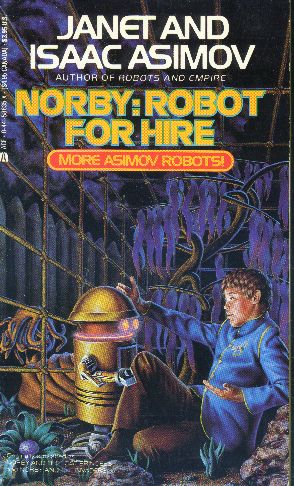 Norby: Robot for Hire |
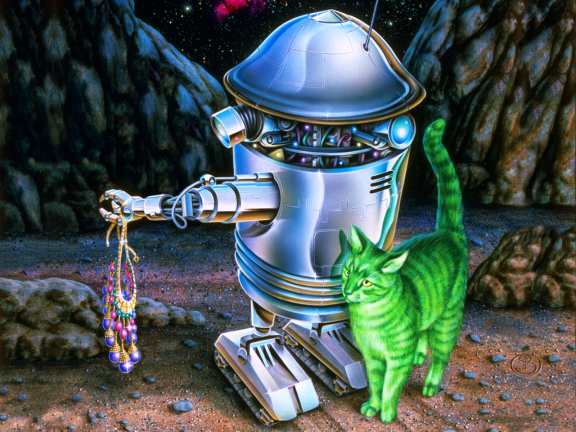 Norby Through Time and Space Barclay Shaw |
Norby, the Mixed-Up Robot (1983) w/ Janet Asimov
Jeff Wells, a space
cadet student and Norby, a second-hand robot with usual abilities, find
themselves involved in the sinister plans of Ing the Ingrate, who
intends to take over the universe.
Norby's
Other
Secret (1984) w/ Janet AsimovWhen
unscrupulous scientists try to kidnap Norby in order to learn the
recret of the robot's anti-gravitational capabilities, he and Jeff
discover on the dragon-inhabited planet of Janya, the key to an even
more precious secret.
Norby and
the
Lost Princess (1985) w/ Janet AsimovThe
lost princess of Iz has disappeared, the planet Melodia
and the evil Slithers. As usual Norby gets them into a lot of trouble,
but, never fear, in the end it is Norby, the awkward little robot, who
discovers the answer to their dilemma.
Norby and
the
Invaders (1985) w/ Janet AsimovJeff and his mixed-up robot, Norby, get involved in new advenures on a strange planet.
Norby and the Queen's Necklace (1986) w/ Janet Asimov
Fourteen-year-old
Jeff Wells and his robot friend Norby are suddenly
transported back to 1785 in France, where they become involved with a
priceless necklace, royal politics, and the accidental creation of
alternate futures for Earth.
Norby Finds A
Villan (1987) w/ Janet AsimovFifteen-year-old
Jeff and his mixed-up robot, Norby, travel backwards
and forwards in time and find themselves prisoners on an alien planet
in another universe.
Norby Down
to
Earth (1988) w/ Janet Asimov Jeff Wells
leaves the space academy with his mixed-up robot Norby and the two of
them head back to Earth to help Jeff's brother unravel a mystery
involving zapped robots and stolen computer parts.
Norby and Yobo's
Great Adventure (1989) w/ Janet AsimovWhenever
Admiral Yobo summoned Norby and Jeff, it usually meant they
were in trouble. This time, their mission was a wild-safari photo
shoot. in Earth's distant past.
Norby and
the
Oldest Dragon (1990) w/ Janet Asimov The planet
Jamyn is throwing a royal birthday bash for the Grand Dragon. Jeff and
Norby are invited too--on one condition: they must persuade the Grand
Dragon's mother to attend the festivities as well.
Norby and
the
Court Jester (1991) w/ Janet AsimovWhile
visiting the toy and game fair on planet Izz, Jeff and Norby
search for a missing robot and the villain responsible for sabotaging
the planet's computer system.
The
Norby
Chronicles (1986) w/ Janet AsimovNorby, the mixed-up robot
Norby's Other Secret
Norby: Robot for Hire (1988) w/ Janet Asimov
Norby and the Lost Princess
Norby and the Invaders
Norby Through Time and Space (1988) w/ Janet Asimov
Norby find a Villain
Norby down to Earth
Novels
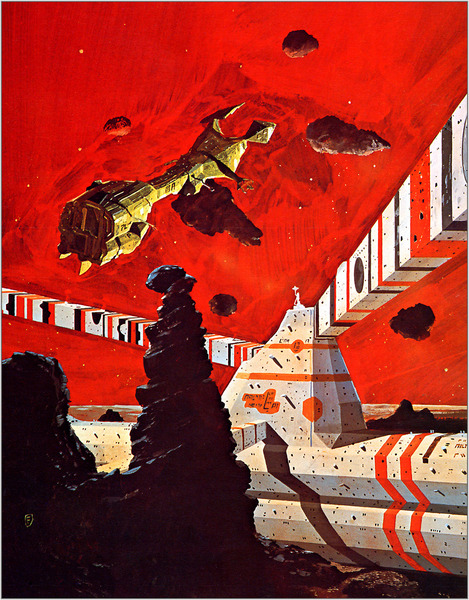 The End of Eternity Chris Foss |
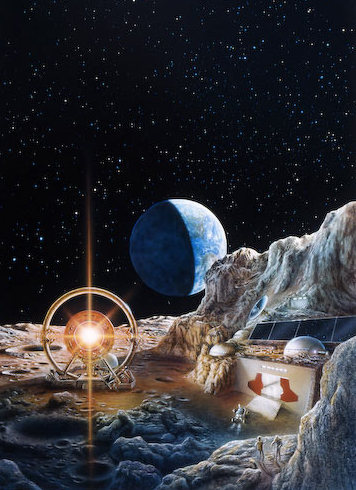 The Gods Themselves Don Dixon |
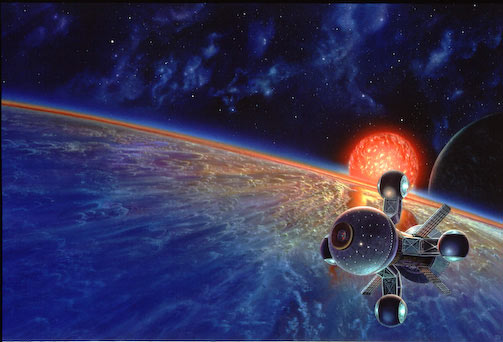 Nemesis Don Dixon |
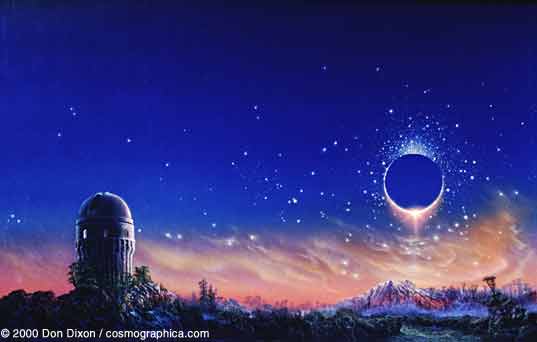 Nightfall w/Robert Silverberg Don Dixon |
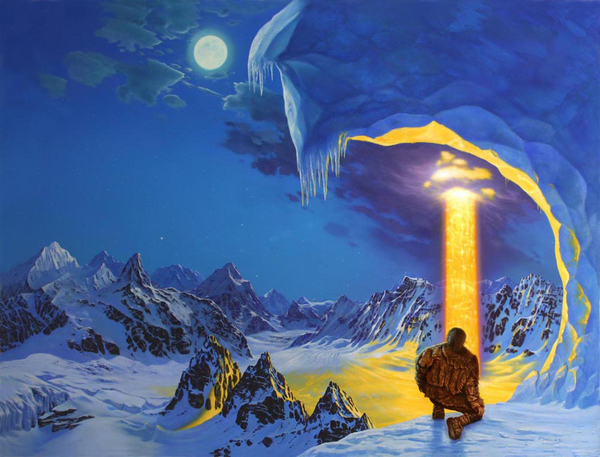 The Ugly Little Boy w/ Robert Silverberg Paul Youll |
The End of Eternity (1955)
In
the fantastic world of THE END OF ETERNITY this terrifying forecast
was entirely possible. The Eternals, the ruling class of the Future,
had the power of life and death not only over every human being but
over the very centuries into which they were born. Past, Present, and
Future could be created or destroyed at will.
You had to be special to become an Eternal. Andrew Harlan was special. Until he committed the one unforgivable sin-falling in love.
Eternals weren't supposed to have feelings. But Andrew Harlan could not deny the sensations that were struggling within him. Andrew knew he could not keep this secret forever. And so he began to plan his escape...a plan that changed his own past...and threatened Eternity itself.
The Gods
Themselves (1972)You had to be special to become an Eternal. Andrew Harlan was special. Until he committed the one unforgivable sin-falling in love.
Eternals weren't supposed to have feelings. But Andrew Harlan could not deny the sensations that were struggling within him. Andrew knew he could not keep this secret forever. And so he began to plan his escape...a plan that changed his own past...and threatened Eternity itself.
In
the year 2100, mankind on Earth, settlers in a
lunar colony and aliens from the para-universe, a strange universe
parallel in time to our own, are faced with a race against time to
prevent total destruction of the Earth. The invention of the
Inter-Universe Electron Pump has threatened the rate of hydrogen fusion
in the sun, leading, inevitably, to the possibilty of a vast explosion
-- and the vapourisation of the Earth exactly eight minutes later . . .
Nemesis (1989)In
the twenty-third century pioneers have escaped the crowed Earth for
life in self-sustaining orbital colonies. One of the colonies,
Rotor, has broken away from the solar system to create its own renegade
utopia around an unknown red star two light-years from Earth: a
star named Nemesis.
Now a fifteen-year old Rotorian girl had learned of the dire threat the Nemesis poses to Earth's people -- but she is prevented from warning them. Soon she will realize that Nemesis endangers Rotor as well. And soon it will be up to her alone to save both Earth and Rotor as -- drawn inexorably by Nemesis, the death star -- they hurtle toward certain destruction.
Nightfall
(1990) w/ Robert SilverbergNow a fifteen-year old Rotorian girl had learned of the dire threat the Nemesis poses to Earth's people -- but she is prevented from warning them. Soon she will realize that Nemesis endangers Rotor as well. And soon it will be up to her alone to save both Earth and Rotor as -- drawn inexorably by Nemesis, the death star -- they hurtle toward certain destruction.
Expanded verison of "Nightfall"
Child of Time (1991) w/ Robert Silverberg/The Ugly Little Boy (1992) w/Robert Silverberg
An expanded verison of "The Ugly Little Boy"
Collections
 The Martian Way and Other Stories Barclay Shaw |
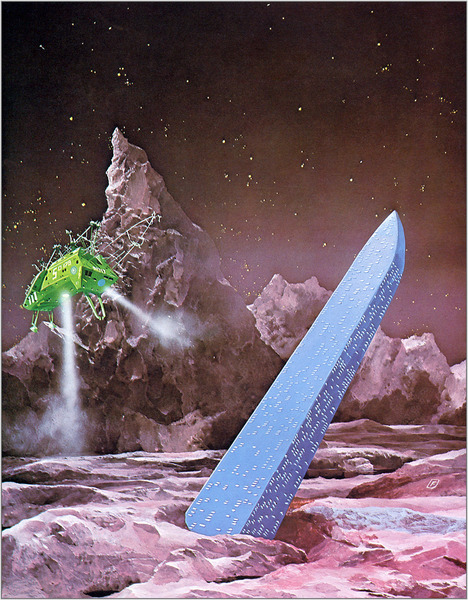 Earth Is Room Enough Chris Foss |
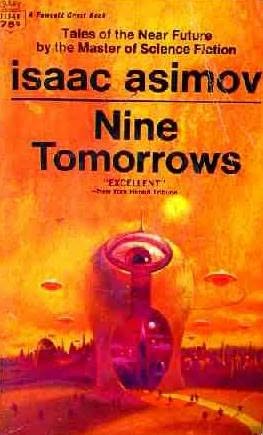 Nine Tomorrows Paul Lehr |
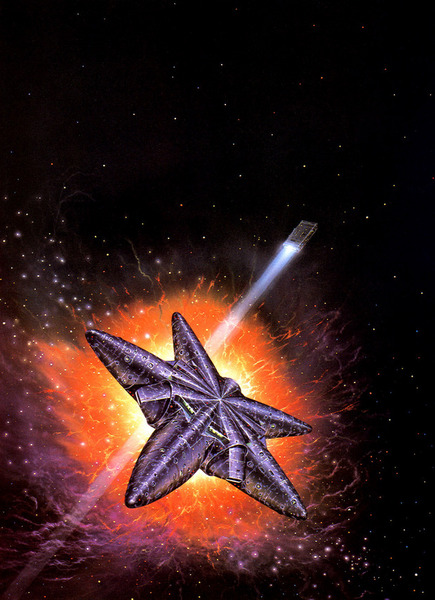 Through a Glass, Clearly Tim White |
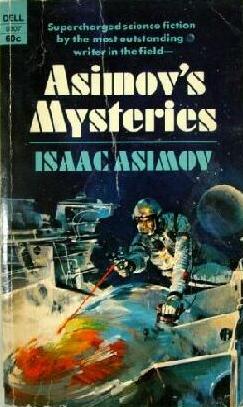 Asimov's Mysteries John Berkey? |
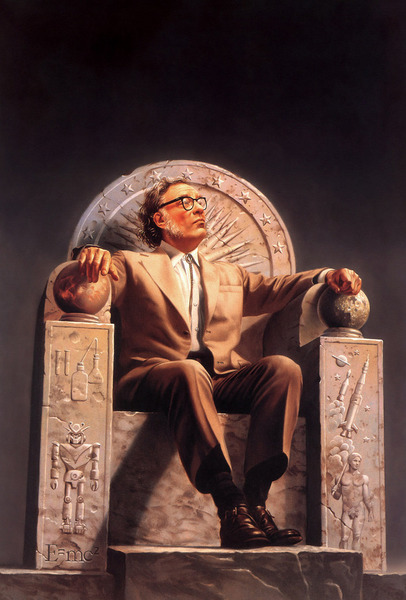 Opus 100 Rowena Morrill |
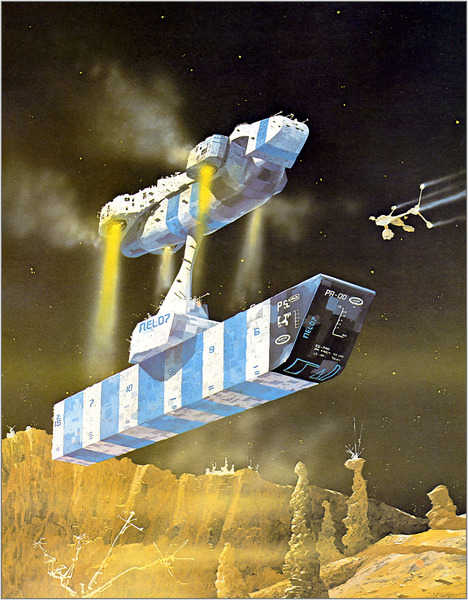 The Early Asimov Volume I Chris Foss |
 Early Asimov Volume II |
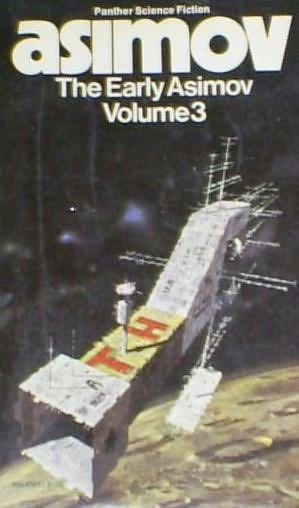 Early Asimov Volume III Chris Foss |
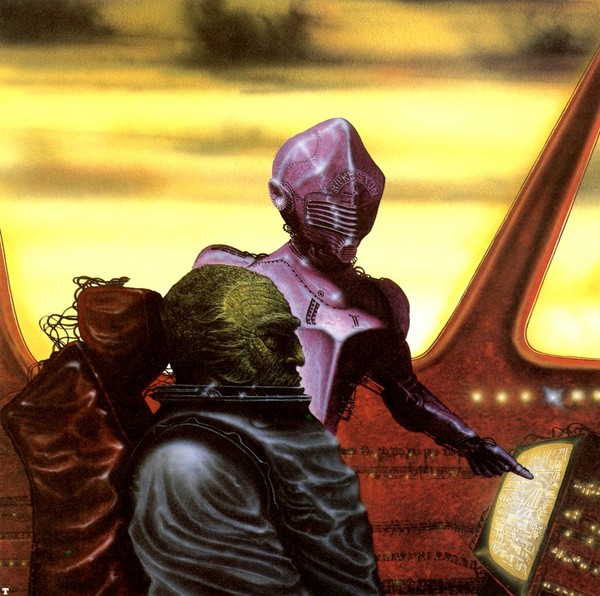 The Best of Isaac Asimov Tony Roberts |
 The Best of Isaac Asimov 1954-1972 Peter Elson |
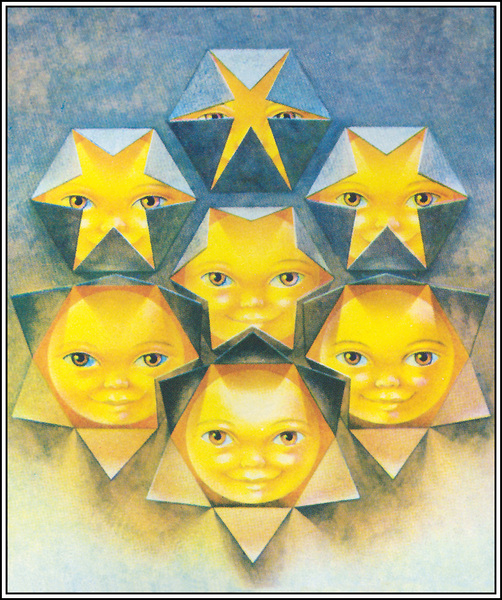 The Best of Isaac Asimov 1939-1952 Patrick Woodroffe |
Have You Seen These? |
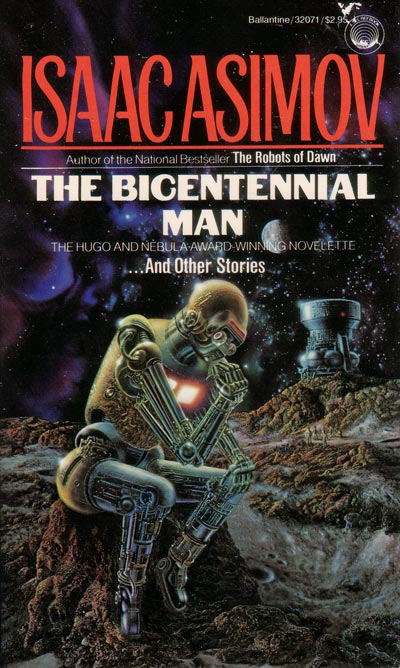 The Bicentennial Man and Other Stories |
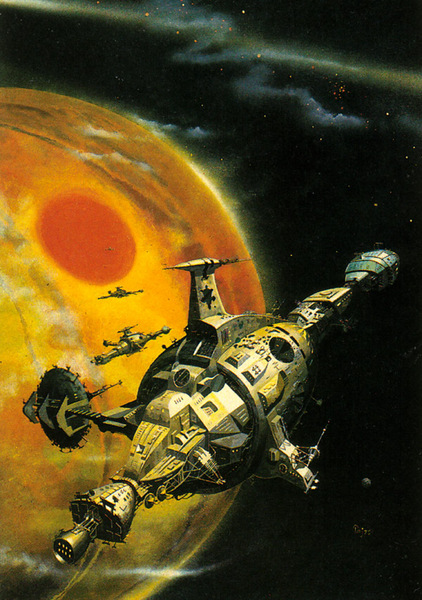 Buy Jupiter and Other Stories Peter A Jones |
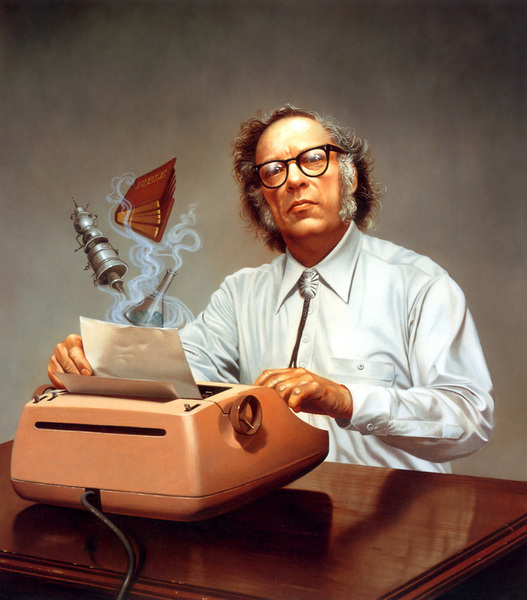 Opus 200 Rowena Morrill |
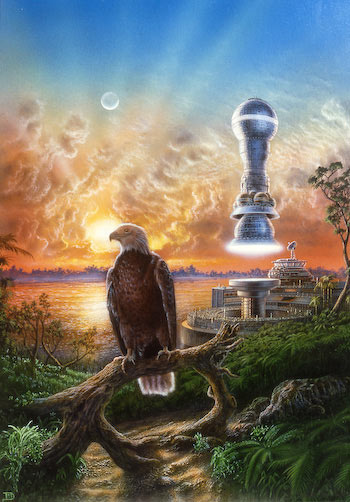 The Winds of Change and Other Stories Don Dixon |
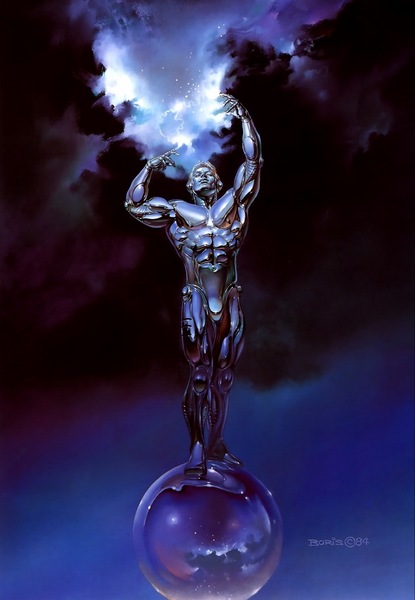 The Edge of Tomorrow Boris Vallejo |
 The Alternate Asimovs |
 Opus 300 |
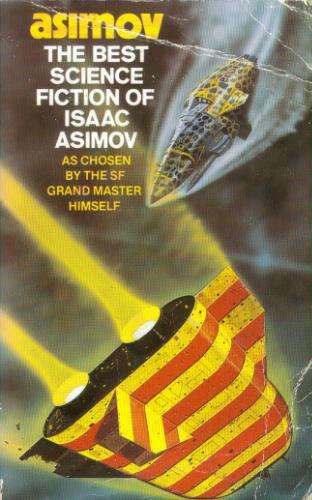 The Best Science Fiction of Isaac Asimov Chris Foss |
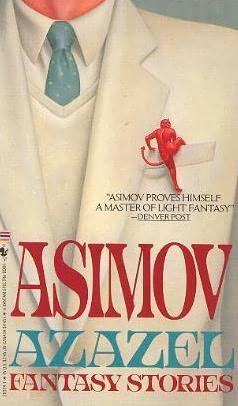 Azazel |
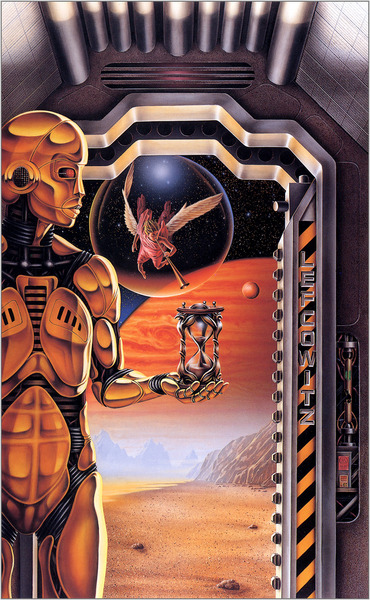 The Complete Stories, Volume I Barclay Shaw |
 The Complete Stories, Volume II Barclay Shaw |
 Gold: The Final Science Fiction Collection |
 Magic: The Final Fantasy Collection |
The Martian Way and Other Stories (1955)
The Martian Way
Youth
The Deep
Sucker Bait
Earth Is Room Enough (1957)
The Dead Past
The Foundation of S.F. Success
Franchise
Gimmicks Three
Kid Stuff
The Watery Place
Living Space
The Message
Satisfaction Guaranteed
Hell-Fire
The Last Trump
The Fun They Had
Jokester
The Immortal Bard
Someday
The Author's Ordeal
Dreaming Is a Private Thing
Nine Tomorrows (1959)
I Just Make Them Up, See!
Profession
The Feeling of Power
The Dying Night
I'm in Marsport Without Hilda
The Gentle Vultures
All the Troubles of the World
Spell My Name with an S
The Last Question
The Ugly Little Boy
Rejection Slips
Through a Glass, Clearly (1967)
It's Such a Beautiful Day
Belief
Breeds There a Man...?
The C-Chute
Asimov's Mysteries (1968)
The Singing Bell
The Talking Stone
What's in a Name?
The Dying Night
Pâté de Foie Gras
The Dust of Death
A Loint of Paw
I'm in Marsport Without Hilda
Marooned Off Vesta
Anniversary
Obituary
Star Light
The Key
The Billiard Ball
Nightfall and Other Stories (1969)
Nightfall
Green Patches
Hostess
Breeds There a Man...?
C-Chute
In a Good Cause
What If-"
Sally
Flies
Nobody Here But-
It's Such a Beautiful Day
Strikebreaker
Insert Knob A in Hole B
The Up-To-Date Sorcerer
Unto the Fourth Generation
What is This Thing Called Love?
The Machine that Won the War
My Son, the Physicist
Eyes Do More Than See
Segregationist
Opus 100 (1969)
The Early Asimov (1972)
The Best of Isaac Asimov (1973)
Marooned Off Vesta
Nightfall
C-Chute
The Martian Way
The Deep
The Fun They Had
The Last Question
The Dead Past
The Dying Night(
Anniversary
The Billiard Ball
Mirror Image
The Best of Isaac Asimov 1954-1972 (1973)
The Best of Isaac Asimov 1939-1952 (1973)
Have You Seen These? (1974)
The Day of the Hunters
Shah Guido G.
The Monkey's Finger
Everest
The Pause
Blank!
Silly Asses
Rain, Rain, Go Away
Buy Jupiter and Other Stories (1975)
Darwinian Pool Room
Day of the Hunters
Shah Guido G.
Button, Button
The Monkey's Finger
Everest
The Pause
Let's Not
Each an Explorer
Blank!
Does A Bee Care?
Silly Asses
Buy Jupiter
A Statue for Father
Rain,Rain, Go Away
Founding Father
Exile to Hell
Key Item
The Proper Study
2430 A.D.
The Greatest Asset
Take A Match
Thiotimoline to the Stars
Light Verse
The Bicentennial Man and Other Stories (1976)
The Prime of Life
Feminine Intuition
Waterclap
—That Thou art Mindful of Him
Stranger In Paradise
The Life and Times of Multivac
The Winnowing
The Bicentennial Man
Marching In
Old-fashioned
The Tercentenary Incident
Birth of a Notion
Opus 200 (1979)
The Winds of Change and Other Stories (1983)
About Nothing
A Perfect Fit
Belief
Death of a Foy
Fair Exchange?
For the Birds
Found!
Good Taste
How It Happened
Ideas Die Hard
Ignition Point!
It Is Coming
The Last Answer
The Last Shuttle
Lest We Remember
Nothing for Nothing
One Night of Song
The Smile That Loses
Sure Thing
To Tell at a Glance
The Winds of Change
The Edge of Tomorrow (1985)
Unique Is Where You Find It
The Eureka Phenomenon
The Feeling of Power
The Comet That Wasn't
Found!
Twinkle, Twinkle, Microwaves
Pâté de Foie Gras
The Bridge of the Gods
Belief
Euclid's Fifth
The Plane Truth
The Billiard Ball
The Winds of Change
The Figure of the Fastest
The Dead Past
The Fateful Lightning
Breeds There a Man?
The Man Who Massed the Earth
Nightfall
The Planet That Wasn't
The Ugly Little Boy
The Three Who Died Too Soon
The Last Question
The Nobel Prize That Wasn't
Opus 300 (1985)
The Alternate Asimovs(1986)
Grow Old Along with Me
The End of Eternity
Belief (two versions)
Final Word
The Best Science Fiction of Isaac Asimov (1986)
The Best Mysteries of Isaac Asimov (1987)
The Obvious Factor
The Pointing Finger
Out of Sight
Yankee Doodle Went to Town
Quicker Than the Eye
The Three Numbers
The One and Only East
The Cross of Lorraine
The Next Day
What Time Is It?
Middle Name
Sixty Million Trillion Combinations
The Good Samaritan
Can You Prove It?
The Redhead
He Wasn’t There
Hide and Seek
Dollars and Cents
The Sign
Getting the Combination
The Library Book
Never Out of Sight
The Magic Umbrella
The Speck
The Key
A Problem of Numbers
The Little Things
Halloween
The Thirteenth Day of Christmas
The Key Word
Nothing Might Happen!
Azazel (1988)
The Two-Centimeter Demon
One Night of Song
The Smile That Loses
To the Victor
The Dim Rumble
Saving Humanity
A Matter of Principle
The Evil Drink Does
Writing Time
Dashing Through the Snow
Logic Is Logic
He Travels the Fastest
The Eye of the Beholder
More Things in Heaven and Earth
The Mind’s Construction
The Fights of Spring
Galatea
Flight of Fancy
The Complete Stories, Volume II (1992)
Gold: The Final Science Fiction Collection (1995)
Magic: The Final Fantasy Collection (1996)
Back to Tirptez' Tales